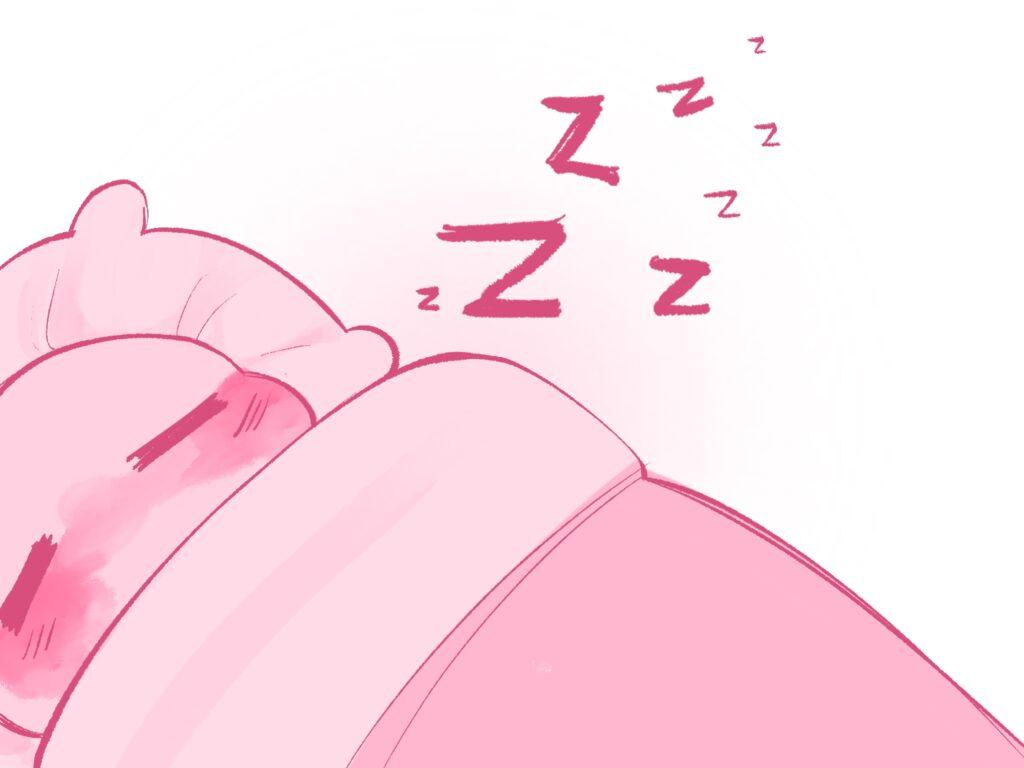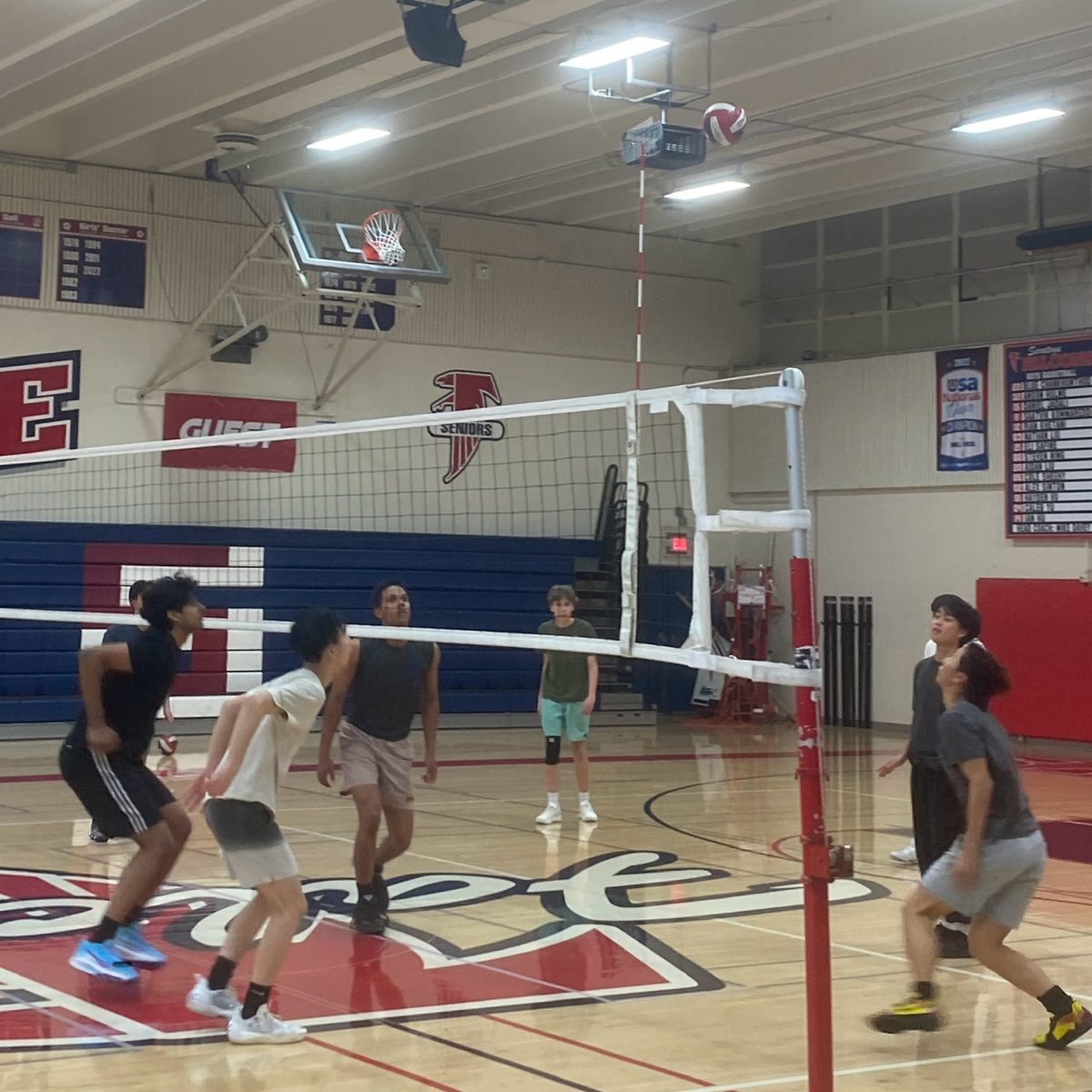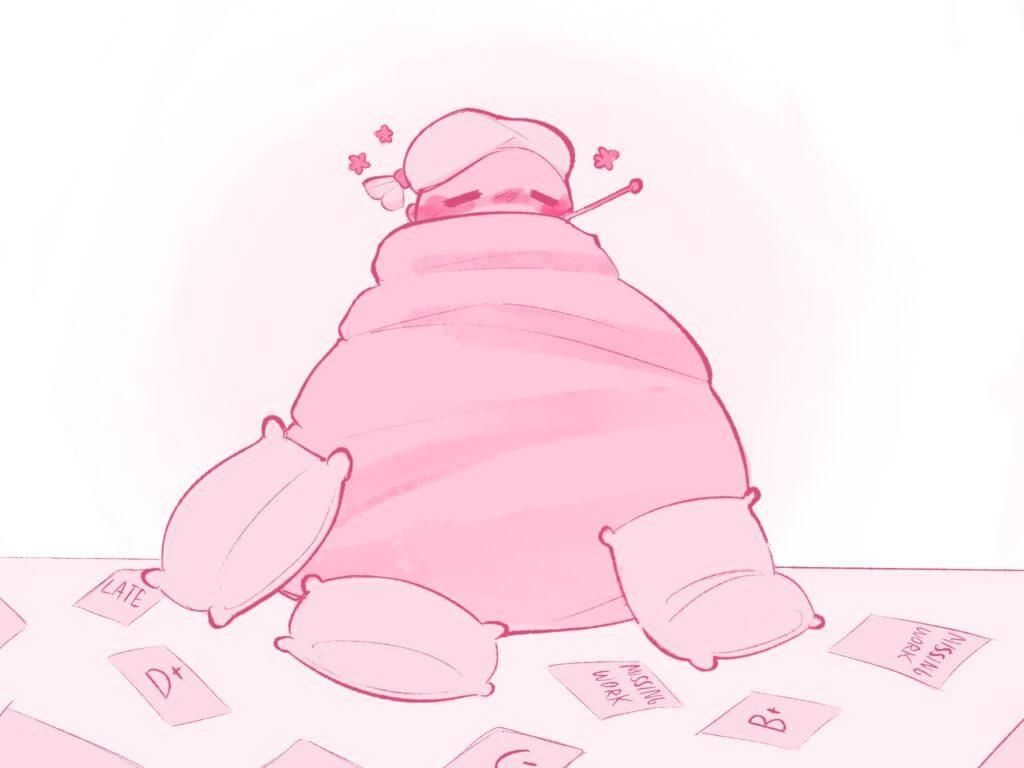If you’re a student here, you already know the life of a teenager in a high-achieving academic environment isn’t all peaches and cream. You’re encouraged to do more extracurriculars than you can fit in your schedule, on top of several AP and Honors classes, and don’t forget robotics and orchestra and marching band and clubs and volunteering for college and family obligations and friendships and potentially even a part-time job.
It’s EXHAUSTING living in a constant state of fervor all the time! It seems most students here don’t have enough time to sleep or BREATHE in because of the expectations they carry. And if you can’t fit everything in and be good at ALL of these things all the time, you feel like you aren’t measuring up, that you’re dumber than your peers who seem to do it all. And your entire FUTURE hinges on it too, so you start to feel like your incompetence will never get you into a “good” college, and that in 20 years you’ll end up living in a cardboard box on the side of the road, wearing only bowler shoes and putting on Sunday soap operas for the local rats to pass the time.

Graphic by Jex Sammael Popov.
This particular graphic came straight from the soul.
This is why I feel that knowing the ways to take care of your body and mental health are absolutely crucial to handling your four years here. Of course, I can only speak for what works for me, but I’ve compiled a list of personal tips that might just help you thrive.
Tip #1: SELF-LOVE AND SELF-ACCEPTANCE, BABYYYY!
I know it’s really easy to just come out here and say “you have to love yourself; you have to accept yourself no matter your achievements!,” but it really IS something that will help you in the long run, mental-health wise.
Both the culture at school and home can directly link academic achievement to your self-worth. The message is too often something along the lines of “you’re only as good as the grades you get and the things you can achieve; if you can’t do everything at once (especially academically) and do it with excellence, you’re a failure and deserve shame.”
But none of us are machines, and we can’t perform well at every moment. We’re human, we fail, we come short, we excel in some things and we struggle with others. The thing is that you WILL fail at some point in your life, and you have to know how to be okay with yourself and move forward from those failures.
You’re worthy even if you fail, even if the artificial letter on your report card isn’t the one you wanted, even if you can’t make friends, can’t run the mile in 10 minutes or can’t ace AP Physics. You’re worthy of love and acceptance from yourself and others, because you’re human. You’re just learning how to live, and you have to be gentle with yourself about that.
This mindset doesn’t change the fact that your parents might expect straight A’s from you or expect you to do 12 extracurriculars, but it’ll lead you to have a stronger foundation of self-worth.
What’s helped for me is starting with self-neutrality — try starting to shift the “ugh, I can’t do well in this hard math class,” and “I’m so awful I’ll never amount to anything” to “hey, this is a hard class, and I’m struggling and I’m feeling really overwhelmed right now.” I’ve learned to be a little softer with yourself, you know? You deserve to have empathy for yourself.
Maybe try broadening your scope, from “I’m terrible at managing these five extracurriculars I’m taking; this is an individual problem and I just need to Toughen Up™ and get over it,” to something like “I’m taking five extracurriculars at once, and I don’t have enough time to do things I enjoy/sleep/eat properly/socialize. No WONDER I’m finding this hard, I’m being deprived of something every human being needs! ANYBODY in that situation would probably find it a bit difficult; there’s no need for me to beat myself up over it.” Maybe not SO clinically, but you get the point. Shifting the way you think can do a lot of good in the long term.

It’s something I still struggle with too. All you can do is keep going.
Well, that was a lot of mush coming from me. There’s more where that came from though, don’t you worry!
Tip 2: Have a support network.
As humans, we’re all social creatures. Some of us might dream of running off to be an isolated shepherd in the mountains of Scotland (especially during finals week), but realistically, what we need in such a high-stress environment is human connection and support.
When you have too many academic responsibilities, it’s sometimes hard to text your friends or acquaintances because you’re too tired and can’t handle more social interactions, or you can’t make plans to meet up over the weekend because of cramming for a looming test. We’ve all been there, it’s OK.
These circumstances can really lead to isolation, and if you’re someone who struggles with depressive symptoms especially then it can all quickly compound into a lot of mental anguish for yourself. The fact is, if you can’t do something 100%, you should still try and do it at least 10-25%.
Chatting with your deskmate in chemistry class is better than not talking to anyone the whole day, and making jokes with your groupmates in a MAP project is better than working in stoic, isolated silence. You can have little chats with your teachers or the people next to you in line at the cafeteria. You get the point.
It’s better to do little things to make you feel less alone. Sharing moments with others reminds you there are people out there with the same struggles as you, that you’re not weird and everyone is doing the best they can. Sometimes these repeated interactions can even turn into friendships, people you can rely on. Everyone needs someone like that.
Photo: link // Graphic by Jex Sammael Popov.
Caption: Me and who?
Tip 3: Get proper rest! (Please)
There’s a saying that goes, “If you don’t decide a rest day for your body, your body will decide the rest day for you.”
It’s very true! It’s like your body passing out when you exercise too much — put yourself under enough stress, and eventually your brain will give out on you. It can happen at REALLY inconvenient times, too, when you REALLY need to get something done, but all your brain is capable of doing is staring at a word doc and not writing your articles for the newspaper, (not that I would know anything about that, of course).
Of course, getting proper sleep is absolutely a given. Duh. The recommended amount of sleep for the high school age range is 8 to 10 hours per night, and if you can afford to, I would ALWAYS prioritize getting at least seven hours of sleep per night over whatever assignment you have to get done. If you often can’t sleep because you have too much homework to do late into the night, I’d recommend trying to restructure your schedule to get more of it done at school. Maybe dropping a class if you want to, dropping an extracurricular activity, making better use of tutorial — all can add time into your day.
My go-to rules for rest are personally to have ONE HOUR of rest/leisure time per day, and ONE DAY of rest/leisure time per week. I usually pick Sunday to be that day, but it’s really up to you. Your leisure time allows you to wring out the sponge of your brain from all the stress it’s under. Hakuna Matata and all. Sometimes during finals week I use that hour per day to have a little cry, which is especially effective for instantly releasing energy.

The masculine urge to hooonk mimimi hooonk mimimi.
Tip 4: enriching the monkey brain.
Adding on to the previous tip, enriching the monkey brain is QUITE effective against stress and being overloaded. This usually involves consuming new media or engaging in a hobby (probably outside of school and not as an extracurricular, reducing your obligation to take it seriously). Go outside. Touch grass.
For times where you REALLY have no time for personal hobbies, what I usually go with is walking home while listening to new music and simply enjoying the weather. The main point is to try and engage the creative side of your brain that forms new ideas and experiences — school encourages a framework of mechanical repetition, where you do essentially the same thing every day. It’s easy to get stuck in a loop like that and become slightly dead inside. Sometimes engaging in brain-stimulating activities like these are even better than rest, I find.

Says the guy with a five foot stack of unread books on his shelf ahaha.
Tip 5: Eat your veggies.
Do it. Do it. Stop gulping down Celsius by the gallon and get some god**** protein and vitamins into your system, you contrarian; your body can’t function without them. And it’ll make you more energized in the long-run! Who would have thought.
For our chronically sleep-deprived companions especially it is VERY important to drink PLENTY of water (LOTS of it!), and to try to eat meat or tofu to get a protein kick. (Heavy sweets and carbs will just cause an energy crash later instead.)
I know sometimes you just forget to eat when you’re swarmed with work, or when your body doesn’t naturally give off a lot of hunger cues (like me ahaha), but in situations like that I WOULD say that routines are your friend.
How I personally arrange it is that I always have my breakfast at around 7:40-7:50 before school, and then I eat lunch at lunch break, and then I have dinner somewhere between 7-8. I find that the school structure really allows for a more rigid, routine approach to eating which personally helps ME with remembering to eat.
If you bring your own lunch to school and prepare it the night before, it might help to try and pack something a little bit more healthy and organic, and then for dinner you can maybe go for something more taste-based. As a little treat, you know? For getting through the school day.

NO SERIOUSLY EAT A VEGETABLE. GO DO IT.
Mini Tips:
To top it all off, here is my lightning round of mini-mental-health tips that I found are useful to know, but don’t require a revamp of your whole lifestyle and all.
I haven’t mentioned the Wellness Center so far, because I assume everyone’s already on board with that. Go there! Use it! The counselors there are really nice, and it’s better to talk to them than to have a panic attack in class!
If you can’t get out of your chair and go to the Wellness Center for whatever reason, stimming — doing repetitive movements with your body as a way to relieve stress — is a good alternative to relieve a bit of tension. Tap your foot, click your pen, tap your fingertips together, twirl your hair, do something repetitive and innocuous like that. It helps your brain focus.
Another focusing tip — if you need something a bit more effective, teach yourself ujjayi breathing. There’s plenty of tutorials online for it – it’s basically the way you breathe when you fog up a mirror by squeezing that little section in the front of your throat. It stimulates your vagus nerve, which controls the parasympathetic nervous system. The parasympathetic nervous system is basically the “resting” state of your body, as opposed to the sympathetic nervous system, which controls your fight-or-flight. Stimulating the nerve that controls it acts as a bit of a shortcut to get your body to switch over to its “resting” state again.
Square breathing works too! You breathe in for about four seconds, hold the breath in your lungs for four seconds, breathe out for four seconds, then hold for four seconds again.
If you get the zoomies during class and don’t feel like it’s deprecating enough for you to go to the Wellness Center, you can excuse yourself to the bathroom and then intentionally take the long route to go to the farthest bathroom from yourself.
And most importantly, remember that you’re doing the best you can. You will get through whatever might be troubling you, and then you’ll get through the next thing, and the next. And soon, you will be in a better place. And you’ll be happier and healthier for it.


























